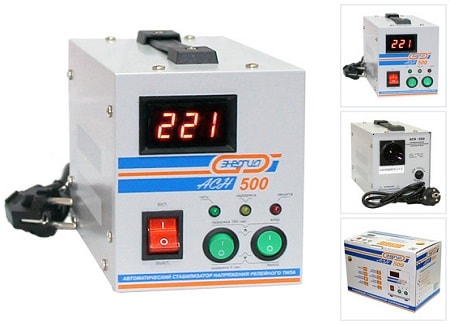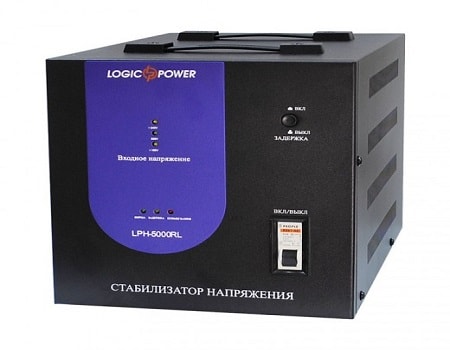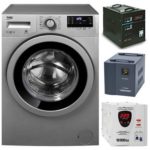Many people ask why you need a voltage stabilizer for a washing machine? Have you ever noticed how in your house or office a light bulb flashes from time to time or a radio pops up? This is the surest sign that the current state of power grids in our country leaves much to be desired. For the power industry, deviation from the nominal voltage of 220V has long become the norm. Moreover, in some cases, no one pays attention even to the “permitted” deviation by 10-15% from the norm.
Surely each of you has heard the story of how all household appliances burned out from a sudden voltage drop in the network in the house. The way out of this situation is very simple. The only solution is to purchase and install a household voltage equalizer in the room. A voltage stabilizer for a washing machine, computer, boiler and other equipment, of course, if selected correctly, is able to protect your equipment from sudden power surges.
Who needs a stabilizer and why
To make sure that you really cannot do without this device, it is worth taking some measurements. This is very easy to do. It is enough 3-4 times a day to measure the voltage readings in the mains using a conventional 220V tester. It is especially recommended to do this during peak hours - in the evening and in the morning, when the amount of energy consumed is maximum.
Advice:
If you use imported equipment for measurements, the required function is usually designated as "True RMS".
Try to make such measurements for at least 3-5 days. This will provide the most complete picture. Depending on the results obtained, the further situation can develop in three ways: (See also: How to choose a machine (RCD) for a washing machine)
- If the measurements show that the voltage readings in the home electrical network did not go beyond 205-235V, then the purchase of a stabilizer may be required only for your personal peace of mind. Also, the device should be installed if you have equipment that is especially valuable or very sensitive to power surges in your apartment or office.
- In cases where the fluctuation from the norm at 220V is -10% or + 7% (198-235V, respectively), it is recommended to install a stabilizer for all equipment.
- If the deviation registered in the network is more than -15% or + 10% (187 -242V, respectively), then your situation can be safely called critical. Using any devices without additional network protection with a stabilizer, you expose them to one hundred percent risk. In this case, purchasing a stabilizing device is not a luxury for you, but a harsh necessity.
![]() See also - How to choose a washing machine under the sink in the bathroom
See also - How to choose a washing machine under the sink in the bathroom
Types of voltage stabilizers
If you still decide to secure your household appliances, then the next step for you is the stabilizer itself. The fact is that these devices are quite different from each other. Each type has its own pros and cons.
There are 4 main types of voltage stabilization devices:
- relay;
- stepped;
- electromechanical (servo-driven);
- electronic.
Relay
The most "running" and the cheapest type of stabilizer equipment. They have a fairly large range of input voltage, but problems with the output voltage can arise - the accuracy of maintaining there is rather low. Such stabilizers are most often used with minimal surges in the network, in the range of 10-15 V. Relay contacts burn out over time or even stick together. This situation leads to the fact that the stabilizer does not work properly. After a while, either the stabilizer itself will fail, or your household appliances will deteriorate.

Stepped
These stabilizers are equipped with a whole system of semiconductors that correct distortion in stages. The response speed of such a device is not very high, but it is the most durable, quite reliable and can work with any 220V power supply network. It is this type of stabilizer that is perfect for a washing machine.
![]() See also - Rating of the best washing machines in 2019
See also - Rating of the best washing machines in 2019
Servos
Electromechanical systems are also referred to as servo drives. Unfortunately, like the previous one, it has a rather low reliability and a rather small operating range. In addition, such devices often sin with wear and tear on the servomotor. Due to the lack of components, repairing them can be a problem. The only advantage of servo-driven stabilizers is the good accuracy of the output voltage. They are capable of providing good protection in the range of 5-7% of the nominal.
Electronic
The highest quality and most modern normalizers have an electronic control circuit. This results in a very fast response to network fluctuations as well as exceptional accuracy. In addition, electronic stabilization devices have the widest range of input voltage, which means they are able to protect your equipment the best.
How to choose the right stabilizer
If you are reading this article, then most likely you have a need to purchase a voltage stabilizer for a washing machine. Of course, if this appliance is the most important and expensive appliance in the entire apartment, then this is a smart move. But it is even more reasonable to protect not only the automatic machine, but all household appliances in the house. Indeed, from voltage surges, both the boiler and the air conditioner and the TV can burn out.
Of course, which devices to take care of and which not is up to you. The main thing here is not to make a mistake and choose a device with a sufficient power.
The power of the stabilizer is the main indicator that you should look at when buying. It should be sufficient to support the operation of all connected electrical appliances. To find out what power the stabilizer is for you, you will have to make some calculations:
- Determine the total number of devices that will be connected to the mains, and therefore to the stabilizer.
- Take the instructions for each device, find the power consumption in them and add together the indicators for all units (in kW).
- Add approximately 20-25% to this figure.
- The resulting number will be the required power of the stabilizer, capable of ensuring the trouble-free operation of household electrical appliances throughout the house.

Another parameter that must be considered before choosing a device is the number of phases. If you are not sure which stabilizer for washing machines and other equipment is right for you, pay attention to the type of power supply in your home. Most often, this information is written on the electricity meter installed in the room. In the vast majority of cases, the home power grid is single-phase. But there are also exceptions. In this case, you will have to buy a three-phase regulator.
![]() See also - What is the power kWh of the washing machine
See also - What is the power kWh of the washing machine
Example for calculating total power
For example, let's calculate how much power the stabilizer needs to be installed in a room where they work in normal mode:
- lighting - 250 W;
- TV set - 150 W;
- washing machine (they wash almost constantly in the house, there is a small child) - 2 kW;
- refrigerator (new model) - 250 W.
When calculating, it must be taken into account that the refrigerator and the automatic machine at start-up consume much more power than during stationary operation. For convenience, you can use the following table:
| Refrigerator (old model) | Refrigerator (new model) | Washing machine | Microwave |
| 5 | 10 | 3–4 | 2 |
This indicator is called the multiplicity factor, you can find it by carefully examining the device passport.
Now we multiply all the indicators by the corresponding coefficient and add the results together:
250x5 + 150 + 2000x3 + 250 = 7650 W or 7.65 kW
Add to the resulting number the power of those electrical appliances that are still present in the house:
- iron - 0.8 kW;
- laptop - 100 W;
- vacuum cleaner - 1.2 kW.
Let's add the result:
7650 + 800 + 100 + 1200 = 9750 W or 9.75 kW
Important:
The rated power of most stabilizers (normalizers) in the passport is indicated at 220V, and the key parameter of this unit is the indicator of the maximum input current. With an input current other than 220V, the maximum power indicator may change.
To avoid such a mistake, we will use a special table:
| Mains voltage, volt | 140 | 150 | 160 | 170 | 180 | 190 | 200 | 220 | 240 | 250 | 260 |
| Stabilizer power change factor | 0,64 | 0,68 | 0,73 | 0,77 | 0,82 | 0,86 | 0,91 | 1 | 0,92 | 0,88 | 0,85 |
| Power Correction Factor | 1,57 | 1,47 | 1,38 | 1,29 | 1,22 | 1,16 | 1,1 | 1 | 1,09 | 1,14 | 1,18 |
This means that if, according to the results of measurements in the electrical network, you have established that the lowest voltage in your network is 160V, then the previously calculated power must be multiplied by a factor of 1.38. We get:
9.75 x 1.38 = 13.455 kW
Remembering that the stabilizer must be selected with a power reserve of at least 20%, we get that a device with parameters of at least 17 kW is suitable for your apartment. Of course, you can get by with a stabilizer and less power, but then you will have to manually turn off some of the devices or make sure that they are not turned on at the same time.
See also:
- 10 best Hotpoint-Ariston washing machines according to customer reviews
- 10 best Electrolux washing machines according to customer reviews
- 10 best ATLANT washing machines according to customer reviews
- 10 best built-in washing machines
- 10 best washing machines under 15,000 rubles according to customer reviews


Yes, this is a huge cabinet with such parameters and weight under 50 kg, and how interesting are you going to connect all household appliances and light there, despite the fact that they are for a maximum of two sockets ..?